*This page last updated: 19 April, 2014 12:04 PST.
Empire Resources
City Resources
See: Cities.
Happiness
- Happiness is now global instead of per-City, so changes in Happiness affect the whole empire. Happiness is displayed on the top bar of the main screen as a net positive or negative value. Positive happiness contributes toward a Golden Age, while Unhappiness slows population growth (in the form of a penalty to surplus food).
- Happiness is decreased for each extra citizen, each city, and especially each annexed foreign city. It is increased through Natural Wonders, luxury resources, and certain Buildings, Wonders and Social Policies.
- If an empire has enough unhappiness to become Very Unhappy (-10 happiness), cities stop growing altogether and can no longer produce Settlers, and military units receive a -10% combat penalty.
- If Happiness reaches -20 or more, revolts will begin to break out in your territory, represented by barbarian units.
- Golden Ages still provide +1 Gold and Production on tiles that have at least one of either. Golden Ages can be triggered by accumulating Happiness points, by expending a Great Person, or through certain other game effects (like completing the Taj Mahal wonder, or by selecting certain Social Policies).
- There is a yellow diamond icon on the main screen that displays progress towards a Golden Age in terms of points of surplus Happiness accumulated. Every turn the empire has positive net Happiness, this value is added toward the total.
Strategic and Luxury Resources
See: Resources.
Technologies
- The Civ V tree, especially in the early eras, is significantly condensed from the previous game, but most of the key technologies are still there. There are no more dead-end technologies, and the nodes relating to religion and civics have been pruned.
- All civilizations start the game with Agriculture, and go from there. There are no more different starting techs for different civilizations (except for special cases like the Huns, who start with Animal Husbandry).
- Technologies can no longer be traded, but you can enter into Research Agreements with other civilizations, which will grant a technology boost after an investment of time and gold.
- New to Brave New World, each new city in your empire increases technology research costs by 5%.
In Gods & Kings, the Classical era has been expanded to 2 tiers, and the post-Industrial eras have been expanded into: Modern, Atomic, and Information eras. Each era now has exactly 2 tiers. There are 8 new technologies. Brave New World adds a single technology (Internet) to the Information Era.
Below is the full Brave New World technology tree. Items new to Brave New World are annotated.
Click on the image for a larger version.

(Compare with the Gods & Kings tree here.)
(Compare with the pre-expansion tree
here.)
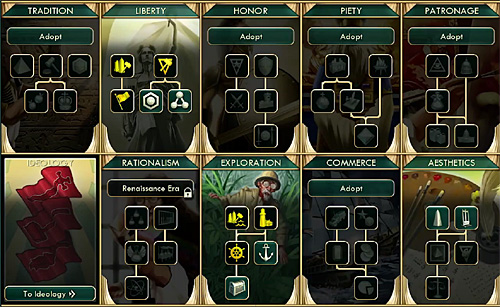 Social Policies
Social Policies
The Government/Civics system has been dramatically overhauled. Rather than having different forms of government or civics that the civilization can choose and switch between, Civ V uses a system called "Social Policies" which consists of 9 separate trees (plus one Ideology tree) in which the civilization can spend Culture and unlock bonuses. These bonuses are cumulative, and the civilization does not "switch" between policies, but rather chooses which trees to invest in.
- You start the game with access to the Tradition, Liberty, and Honor trees, and other trees unlock at certain eras.
- The cost of the next policy increases each time you purchase a policy. This cost is the same regardless of how deep in the tree the policy is.
- Each city you own will increase Social Policy costs by 10% (was 30%). Puppeted cities don't count toward this total.
- The Advanced View button at top right shows you all of the trees rather than the background artwork.
- Order, Autocracy and Freedom are now Ideologies instead of Social Policies.
Jon Shafer: 'With the policies system, we wanted to keep the feel of mixing and matching to construct one's government that was part of Civ IV, but we also wanted to instill a sense of forward momentum. Rather than having to switch out of one policy to adopt another, you build upon the policies already unlocked. The thought process we want to promote is "What cool new effect do I want?" rather than the feeling of needing to perform detailed analysis to determine if switching is a good idea.'
Here is the list of Social Policies, updated for Brave New World (changes for the expansion are marked in red). To see the Gods & Kings version: look here.
Tradition
Adopting Tradition greatly increases the rate of border expansion in cities and also grants +3 Culture in the Capital. Unlocks building the Hanging Gardens. Adopting all Policies in the Tradition tree will grant +15% Growth and a free Aqueduct in your first 4 cities. It also allows the purchase of Great Engineers with Faith starting in the Industrial Era.
- Aristocracy: +15% when building Wonders and +1 Happiness for every 10 Citizens in a City.
- Oligarchy: Garrisoned units cost no maintenance and cities with a garrison gain +50% Ranged Combat Strength.
- Legalism: Provides a free culture building in your first 4 cities.
- Monarchy: +1 Gold and -1 Unhappiness for every 2 Citizens in the Capital. (requires Legalism)
- Landed Elite: +10% Growth and +2 in the Capital. (requires Legalism)
Liberty
Liberty is best for civilizations which desire rapid expansion. Adopting Liberty will provide 1 Culture in every city. Unlocks building the Pyramids. Adopting all policies in the Liberty tree will grant a free Great Person of your choice near the Capital.
- Republic: +1 Production in every City and +5% Production in cities when construction Buildings.
- Citizenship: Tile improvement construction rate increased by 25% and a Worker appears near the Capital.
- Collective Rule: Speeds the training of Settlers by 50% in the Capital and a free Settler appears near the Capital. (Venice receives a Merchant of Venice instead of a Settler.) (requires Republic)
- Representation: Each city you found will increased the Culture cost of policies by 33% less than normal. Also starts a Golden Age. (requires Citizenship)
- Meritocracy: +1 Happiness for each City you own connection to the Capital and -5% Unhappiness from Citizens in non-occupied Cities. (requires Citizenship)
Honor
Honor improves the effectiveness of one's army in a variety of ways. Adopting Honor gives a +33% combat bonus vs Barbarians, and notifications will be provided when new Barbarian Encampments spawn in revealed territory. Gain Culture for the empire from each barbarian killed. Unlocks building the Statue of Zeus. Adopting all policies in the Honor tree will grant Gold for each enemy unit killed. It also allows the purchase of Great Generals with Faith starting in the Industrial Era.
- Warrior Code: +15% Production when training Melee units and a Great General appears outside the Capital. Great Generals are earned 25% faster.
- Discipline: +15% Combat Strength for melee Units which have another military Unit in an adjacent tile.
- Military Tradition: Military Units gain 50% more Experience from combat. (requires Warrior Code)
- Military Caste: Each City with a garrison increases Local City Happiness by 1 and Culture by 2. (requires Discipline)
- Professional Army: Gold cost of upgrading Military Units reduced by 33% and construct Barracks, Armories, and Military Academies 50% faster. (requires Military Caste)
Piety
Unlocks at Ancient Era. Adopting Piety allows you to build Shrines and Temples in half the usual time. Unlocks building the Great Mosque of Djenne. Adopting all Policies in the Piety tree causes a Great Prophet to appear and Holy Sites provide +3 Culture. Piety is no longer mutually exclusive with Rationalism.
- Organized Religion: +1 Faith from Shrines and Temples.
- Mandate of Heaven: 20% discount on all purchases of religious units and buildings with Faith.
- Theocracy: Temples increase a city's Gold output by 10%. Holy Sites provide +3 Gold. (requires Organized Religion)
- Religious Tolerance: Cities with a majority religion also get the Pantheon belief bonus of the second most popular religion. (requires Organized Religion)
- Reformation: If you founded a religion, gain a bonus Reformation belief. (requires Mandate of Heaven, Religious Tolerance)
Patronage
Unlocks at Medieval Era. Adopting Patronage will cause Influence with City-States to degrade 25% slower than normal. Unlocks building the Forbidden Palace. Adopting all policies in the Patronage tree will cause allied City-States to occasionally gift you Great People (and no longer causes other players' Influence with City-States to decrease).
- Philanthropy: Gifts of Gold to a City-State generate 25% more Influence.
- Consulates: Resting point for Influence with all City-States is increased by 20.
- Scholasticism: All City-States which are Allies provide a Science bonus equal to 25% of what they produce for themselves. (requires Philanthropy)
- Cultural Diplomacy: Quantity of Resources gifted by City-States increased by 100%. Happiness from gifted Luxuries increased by 50%. (requires Scholasticism)
- Merchant Confederacy: +1 Gold for trade routes with City-States.
Rationalism
Unlocks at Renaissance Era. Adopting Rationalism with grant +10% Science while the empire is Happy. Unlocks building the Porcelain Tower. Adopting all policies in the Rationalism tree will grant a free Technology. It also allows the purchase of Great Scientists with Faith starting in the Industrial Era. Rationalism is no longer mutually exclusive with Piety.
- Secularism: +2 Science from every Specialist.
- Humanism: Great Scientists are earned 25% faster.
- Free Thought: +1 Science from every Trading Post and +17% Science from Universities. (requires Secularism).
- Sovereignty: +1 Gold from Science buildings. (requires Humanism).
- Scientific Revolution: Boosts Science gained from Research Agreements by 50%. (requires Free Thought).
Exploration
Unlocked in the Medieval era. Exploration enhances your ability to spread your empire
over the seas. Adopting Exploration gives +1 Movement for Naval units and +1
Sight for Naval Combat units. Unlocks building the Louvre. Adopting all policies
allows you to see Hidden Antiquity Sites. It also allows the purchase of Great
Admirals with Faith starting in the Industrial Era.
- Maritime Infrastructure: +3 Production in all coastal Cities.
- Naval Tradition: +1 Happiness for each Harbor, Seaport, or Lighthouse.
- Navigation School: A Great Admiral appears. +2 Movement for all Great Admirals. Great Admirals are earned 25% faster. Requires Naval Tradition.
- Merchant Navy: +1 Gold for each Harbor, Seaport or Lighthouse. Requires Maritime Infrastructure and Naval Tradition.
- Treasure Fleets: +4 Gold from all your sea trade routes. Requires Merchant Navy.
Commerce
Unlocks at Medieval Era. Adopting Commerce will boost Gold output in the Capital by 25%. Unlocks building Big Ben. Adopting all policies in the Commerce tree will grant +1 Gold for every Trading Post and double Gold from Great Merchant trade missions. It also allows you to purchase Great Merchants with Faith starting in the Industrial Era.
- Wagon Trains: +2 Gold from all your Land Trade Routes.
- Trade Unions: Maintenance paid on Roads and Railroads reduced by 50%.
- Entrepreneurship: Great Merchants are earned 25% faster. (requires Wagon Trains)
- Mercantilism: Purchasing items in Cities requires 25% less Gold. +1 Science from every Mint, Market, Bank and Stock Exchange. (requires Trade Unions)
- Protectionism: +2 Happiness from every Luxury Resource. (requires Entrepreneurship and Mercantilism)
Aesthetics
Unlocked in the Classical era. Adopting
Aesthetics allows you to earn Great Writers, Artists and Musicians 25% faster.
Unlocks building the Uffizi. Adopting all policies doubles the theming bonus you
receive from your Museums and Wonders. It also allows the purchase of Great
Writers, Artists, or Musicians with Faith starting in the Industrial Era.
- Cultural Centers: Construct Monuments, Amphitheaters, Opera Houses, Museums and Broadcast Towers 50% faster.
- Fine Arts: 50% excess Happiness added each turn to the amount of Culture that may be spent on Social Policies.
- Flourishing of the Arts: Culture increased by 33% in all cities which have built a World Wonder and the empire immediately enters a Golden Age. Requires Cultural Centers and Fine Arts.
- Artistic Genius: A Great Artist appears. Requires Fine Arts.
- Ethics: Reduces the Culture cost of future Policies by 10%. Requires Flourishing of the Arts.
Ideologies
You must choose one of three Ideology options (Freedom, Order or Autocracy) once you either build 3 Factories or reach the Modern Era. These Ideologies are now separate from the normal Social Policy trees. In addition to determining which Tenets (similar to Social Policies) are available to you, your choice of Ideology will impact your relations with other civilizations, improving relations with those of the same Ideology, and degrading those who have chosen a different one. Helpfully, in the dialog where you are asked to choose an Ideology, you are shown the Ideologies of those other civilizations who have already made a choice. It is possible to change Ideologies, but not when your people are content (see Public Opinion, below).
If you are the one of the first two civilizations to adopt a particular Ideology, you will be awarded one or two free "Early Adopter" tenets.
Ed Beach: "The different victory types are allied with Ideologies. So each Ideology is good at three out of the four victory types. If I'm going for a Space Race victory, for instance, I have to go either Freedom or Order. I have to go either the Soviet space model or the US space model."
Public Opinion
There is a new status for each civilization linked to Ideology called Public Opinion, which is displayed in the Culture Victory tab of the Culture Overview dialog. It measures a civilizations' satisfaction with their current Ideology choice. If another civilization with a different ideology begins to overwhelm your culture with their tourism, then your Public Opinion will begin to decline. Possible value are Content, Dissidents, Civil Resistance, and Revolutionary Wave. Some level of Unhappiness will be generated if this satisfaction level is anything other than Content. At an overall Happiness level of -20 or below the civilization will start to lose cities to revolt and may change the public's Preferred Ideology (you can find that preference in the Public Opinion tooltip). If this situation becomes bad enough, you may have to switch Ideologies to placate your public. This would presumably mean losing access to the Tenets that you have purchased. It's not currently clear what "revolt" means specifically, whether cities go into a state of anarchy, or whether they actually change allegiance to another civilization.
Dennis Shirk: "If I choose say, Order, and you’re Freedom, and I’m generating all this Tourism, my influence is going to start pressing on your empire and your people are going to start getting unhappy. If you let it go on too long, you basically have to either declare war on me or switch to my ideology. Your cities might start flipping to my civilization if they riot too much."
Kate Distler: "When your happiness gets down to -20, then your Cities will start abandoning your empire. If your people are this unhappy, they will have a Preferred Ideology they’d like to switch to. We look at all your cities to see how close they are to the capital cities of the civs following that Ideology (and how much pressure you are receiving from each of those civ’s cultures). Based on those factors we can pick the city that will flip (and which civ it will defect to)."

Tenets
Each Ideology has a three-tiered set of 16 policies called Tenets that can be purchased with Culture; after you have chosen an Ideology, when you earn enough Culture to purchase a Social Policy, you are given the choice of either purchasing a Social Policy or purchasing a Tenet. Every Tenet after the first in a tier unlocks one Tenet in the next tier, but the requirements are not specific as in Social Policies; within a tier, you can choose any Tenet that you want, similar to Beliefs.
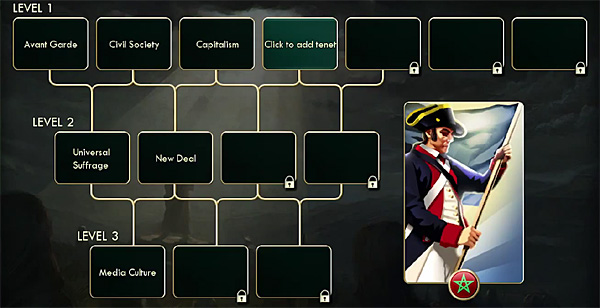
Order
- Level 1
- Hero of the People: The rate at which Great People are born is increased by 25%.
- Socialist Realism: +2 Local Happiness from Monuments. Build Monuments in half the usual time.
- Skyscrapers: Gold cost of purchasing buildings reduces by 33%.
- Patriotic War: +15 attack bonus when fighting in friendly territory.
- Double Agents: Spies twice as likely to capture enemy spies attempting to steal a technology.
- Young Pioneers: +1 local Happiness from every Workshop, Factory, and Solar/Nuclear/Hydro Plant.
- Universal Healthcare: +2 Local Happiness from every National Wonder.
- Level 2
- Academy of Sciences: +1 Local Happiness from every University, Observatory, Public School, and Research Lab.
- Party Leadership: +1 Food, Production, Science, Gold and Culture per city.
- Resettlement: New Cities start with an extra 1 Population.
- Cultural Revolution: +34% Tourism to other Order civilizations.
- Worker's Faculties: Factories increase a City's Science output by 25%. Build Factories in half the usual time.
- Five-Year Plan: +2 Production per City and +1 Production for every Mine and Quarry.
- Level 3
- Dictatorship of the Proletariat: +34% Tourism to civilizations that have less Happiness.
- Iron Curtain: Free Courthouse upon city capture.
- Spaceflight Pioneers: May finished Spaceship parts with Great Engineers. +10 Science in Capital City.
Freedom
- Level 1
- Avant Garde: The rate at which Great People are born is increased by 25%.
- Creative Expression: +1 Culture from each Great Work (but Tourism is unchanged).
- Civil Society: Specialists consume only half the normal amount of Food.
- Covert Action: Chance of rigging election in City-States doubled.
- Capitalism: +1 Local Happiness from every Mint, Bank, and Stock Exchange.
- Economic Union: +3 Gold from all your trade routes with other civilizations following the Freedom Ideology.
- Universal Healthcare: +2 Local Happiness from every National Wonder.
- Level 2
- Volunteer Army: Receive 6 free Foreign Legion units (no maintenance)
- Urbanization: +1 Local Happiness from every Granary, Water Mill, Aqueduct, and Hospital.
- Their Finest Hour: Combat Strength of Cities increased by 33%.
- Universal Suffrage: Specialists in Cities produced half the normal amount of Unhappiness. Golden Ages are 50% longer.
- New Deal: All Great Person improvements produce +4 of the appropriate yield.
- Arsenal of Democracy: +25% Production when building Military Units. +20 Influence from Military Unit gifts to City-States.
- Level 3
- Media Culture: +34% Tourism generated by cities with a Broadcast Tower.
- Treaty Organization: Gain 4 more Influence per turn (at Standard speed) with City-States you have pledged to protect.
- Space Procurements: Buy Spaceship parts for gold
Autocracy
- Level 1
- Elite Forces: Wounded Military Units inflict 25% more damage than normal.
- Mobilization: Gold cost of purchasing units reduced by 33%.
- United Front: Militaristic City-States grant units twice as often when you are at war with a common foe.
- Futurism: +100 Tourism with all known civs when a Great Writer, Artist or Musician is born.
- Industrial Espionage: Spies steal technologies at twice the normal rate.
- Fortified Borders: +2 Local Happiness from every Walls, Castle, Arsenal and Military Base.
- Universal Healthcare: +2 Local Happiness from every National Wonder.
- Level 2
- Militarism: +2 Local Happiness from every Barracks, Armory and Military Academy.
- Lightning Warfare: +3 Movement for Great Generals. Armor units gain +15% attack, +1 Movement and ignore enemy ZOC.
- Police State: +3 Local Happiness from every Courthouse. Build Courthouses in half the usual time.
- Nationalism: Reduces Unit Gold Maintenance costs by 33%.
- Third Alternative: Quantity of Strategic Resources produced is increased by 100%. +5 Food and +5 Science in Capital.
- Total War: +25% Production when building Military Units and new Military Units start with +15 Experience.
- Level 3
- Cult of Personality: +50% Tourism to civilizations fighting a common enemy.
- Clausewitz's Legacy: Receive a 25% attack bonus to all Military Units for the first 50 turns after this policy is adopted.
- Gunship Diplomacy: +6 Influence boost each turn with City-States from which you could demand tribute
Religion
Religion is based on a resource called Faith, which can be earned by exploring ancient ruins, constructing religious buildings such as Shrines and Cathedrals, building religious Wonders, and through special abilities (like the Celts' ability to earn Faith from forests or through their Pictish Warrior's ability to generate Faith in combat).
Religions can be customized and developed from a simple pantheon to a modern religion by selecting "Beliefs" that offer specific benefits. You choose Beliefs from a pool (of about 50), and they are unique; choosing a Belief makes it unavailable to any other Religions in that game. A religion may accrue up to a total of five Beliefs over time (though the Byzantines have the special ability to unlock a bonus sixth Belief).
A religion starts out as a primitive animist Pantheon, which is available very early in the game when your civilization has accumulated about 10 Faith. The symbol of a Pantheon is a lightning bolt. A Pantheon has a single Belief chosen from a pool of ~20 Pantheon Beliefs, that provides a basic resource or Faith bonus for certain terrain types. Pantheons do not spread beyond your borders. The amount of Faith it takes to found a Pantheon will increase with every Pantheon that has been founded on the whole map.
Once your civilization has accumulated a certain Faith threshold (depending on game speed), you have a chance every turn to generate a Great Prophet. (When the Prophet spawns, it empties your Faith reserve, regardless of how much above the threshold you had built up.) This Prophet can be used to convert your Pantheon into a full-blown Religion. When founding a Religion, you choose one of the 11 available icons and names (you can change the name), and two more Beliefs, called a Founder and Follower Beliefs, each from a separate pool. When you get a second Great Prophet, you can then Enhance your religion, which unlocks two more Belief slots (called 2nd Follower and Enhancer Beliefs).
The 11 available religion icons are: Buddhism, Christianity, Confucianism, Hinduism, Islam, Judaism, Shinto, Sikhism, Taoism, Tengriism, and Zoroastrianism.
There is a cap on how many Religions can be created in one game (looks like half the total number of civilizations). This limit applies only to Religions and not to Pantheons.
 Beliefs
Beliefs
Beliefs are grouped into four categories: Pantheon, Founder, Follower and Enhancer. Pantheon Beliefs offer basic production bonuses for resources and terrain. Founder Beliefs offer bonuses that benefit only the founder of the religion. Follower Beliefs offer city-specific bonuses or special structures that can benefit any city that follows the religion. Enhancer Beliefs give you access to things like cheaper missionaries, allowing you to spread your religion faster. The total number of Beliefs that a mature Religion can have is five. There is also a sixth Bonus Belief, available only to the Byzantines, which can be chosen from all the available Belief types. Once a Belief is chosen, it becomes unique to that religion and cannot be chosen again by a different religion in the same game. Reformation Beliefs are special, powerful beliefs, one of which is awarded with the Reformation Social Policy.
Pantheon Beliefs:
Ancestor Worship: +1 Culture for every Shrine in your civilization
Dance of the Aurora: +1 Faith from Tundra tiles without Forest
Desert Folklore: +1 Faith from Desert tiles
Earth Mother: +1 Faith from Copper, Iron, and Salt
Faith Healers: +30 HP healed per turn if adjacent to a friendly city
Fertility Rites: 10% faster Growth Rate
God of Craftsmen: +1 Production in cities with population of 3+
God of the Open Sky: +1 Culture from Pastures
God of the Sea: +1 Production from Fishing Boats
God of War: Gain Faith if you win a battle within 4 tiles if your city
God-King: +1 Culture, Faith, Gold, Production, and Science from the
Palace
Goddess of Festivals: +1 Culture and +1 Faith for each Wine and Incense
Goddess of Love: +1 Happiness from cities with population of 6+
Goddess of Protection: +30% increase in city Ranged Combat Strength
Goddess of the Hunt: +1 Food from Hunting Camps
Messenger of the Gods: +2 Science in cities with a Trade Route
Monument to the Gods: +15% Production of Ancient/Classical Wonders
Mother Goddess: (increased food production)
One with Nature: +2 Faith from Natural Wonders
Oral Tradition: +1 Culture from Plantations
Religious Idols: +1 Culture and +1 Faith for each Gold and Silver
Religious Settlements: +15% faster border growth
Sacred Path: +1 Culture from Jungle tiles
Sacred Waters: +1 Happiness from cities on rivers
Stone Circles: +2 Faith from Quarries
Sun God: +1 Food from Bananas, Citrus, and Wheat
Tears of the Gods: +2 peace Faith from each Gems or Pearls resource
Founder Beliefs:
Ceremonial Burial: +1 Happiness for each City following Religion
Church Property: +2 Gold for each City following Religion
Initiation Rites: +100 Gold when each City first converts to this
Religion
Interfaith Dialogue: Gain Science when a Missionary spreads this religion
to cities of other religions
Papal Primacy: +15 to Influence resting point with City-States following this
religion
Peace Loving: +1 Happiness for every 5 followers of this religion in
non-enemy foreign cities
Pilgrimage: +1 Faith for each foreign city following this religion
Tithe: +1 Gold for every 4 followers of this religion
World Church: +1 Culture for every 5 followers of this religion in other
civilizations
Follower Beliefs:
Asceticism: Shrines provide +1 Happiness in Cities with 3 followers
Cathedrals: Use Faith to purchase Cathedrals (+1 Faith, +3 Culture, +1
Happiness, Artist Specialist slot)
Choral Music: Temples provide +2 Culture in Cities with 5 followers
Divine Inspiration: Each World Wonder provides +2 Faith in city
Feed the World: Shrines and Temples provide +1 Food each in city
Guruship: +2 Production if city has a Specialist
Holy Warriors: Use Faith to purchase pre-Industrial land units
Liturgical Drama: Amphitheaters provide +1 Faith in cities with 3
followers
Monasteries: Use Faith to purchase Monasteries (+2 Faith, +2 Culture,
more with Wine or Incense)
Mosques: Use Faith to purchase Mosques (+3 Faith, +2 Culture, +1
Happiness)
Pagodas: Use Faith to purchase Pagodas (+2 Faith, +2 Culture, +2
Happiness)
Peace Gardens: Gardens provide +2 Happiness in city
Religious Art: Hermitage provides +5 Culture and +5 Tourism
Religious Center: Temples provide +2 Happiness in cities with 5 followers
Religious Community: +1% Production for each follower (max +15%)
Swords into Plowshares: 15% faster Growth rate for city if not at war
Enhancer Beliefs:
Defender of the Faith: +20% Combat near friendly Cities that follow this
Religion
Holy Order: Missionaries and Inquisitors cost 30% less Faith
Itinerant Preachers: Religion spreads to cities 30% further away
Just War: +20% Combat near enemy Cities that follow this Religion
Messiah: Prophets 25% stronger and earned with 25% less Faith
Missionary Zeal: Missionary conversion strength +25%
Religious Texts: Religion spreads 34% faster (68% with Printing Press)
Religious Unity: Religion spreads to friendly city-states at double rate
Reliquary: Gain 50 Faith each time a Great Person is expended
Reformation Beliefs:
Charitable Missions: Influence boosts from Gold gifts to City-States are
increased by 30%.
Evangelism: Missionaries' Spread Religion action erodes existing
pressure from other religions.
Heathen Conversion: Missionaries convert adjacent barbarians to
this civilization.
Jesuit Education: May build Universities, Public Schools, and Research
Labs with Faith.
Religious Fervor: Use Faith to purchase Industrial Era (and later) land
units.
Sacred Sites: All buildings purchased with Faith provide 2 Tourism each.
The Glory of God: Use Faith to purchase any type of Great Person
starting in Industrial Era.
Underground Sect: Your spies exert religious pressure on the cities they
occupy.
Unity of the Prophets: Inquisitors and Prophets reduce this religion's
presence by half (instead of eliminating it).
Spreading Religion
Each citizen of a city is either an atheist or is converted to a Pantheon or Religion individually. If a majority of citizens in a city follow a particular Religion, then that becomes the "majority Religion" and the city is said to follow that religion, and will generate religious "Pressure" that extends 10 hexes and will slowly convert citizens of other cities to that religion. Majority religion is indicated by an icon on the city bar (see image at right), and mousing over this icon brings up a tooltip that identifies how many citizens follow each religion in the city, how much religious "Pressure" is exerted by each religion, and whether or not this city is the "Holy City" for a given religion. The Holy City is the city (usually the capital) in which the first Great Prophet founded the religion, and it appears to generate additional Pressure. Ed Beach: "If you, as a founder of a religion, have your Holy City captured, you will lose the Founder benefit. That being said, the conqueror does not gain those benefits, they just cease to exist until you’re able to recapture your Holy City."
Pantheons do not generate religious Pressure, and will not spread beyond your borders. It's not clear how Pantheons spread (if at all) within your civilization; it may be that each of your cities automatically gets 1 or 2 followers of the Pantheon and that's it. These Pantheon followers still remain in your cities when the Pantheon is transformed into a Religion; presumably they are converted by religious pressure over time to the new Religion.
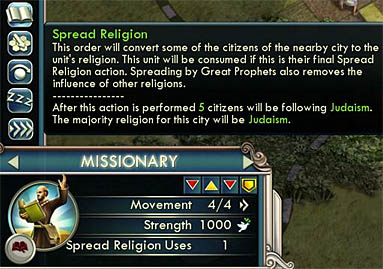 Religions
can spread on their own from one city to another within 10 hexes (without regard
to national borders), converting one citizen at a time depending upon existing
religious pressure. Missionary
units can be used to accelerate this process. Inquisitors can be used to "stamp out" a competing
religion from a city (called "Remove Heresy"), or can be used
passively to prevent the spread of religion to the city in which they are
stationed. The costs of both Missionaries and Inquisitors increases with each
Era, so the best time to spread
your religion is early in the game.
Religions
can spread on their own from one city to another within 10 hexes (without regard
to national borders), converting one citizen at a time depending upon existing
religious pressure. Missionary
units can be used to accelerate this process. Inquisitors can be used to "stamp out" a competing
religion from a city (called "Remove Heresy"), or can be used
passively to prevent the spread of religion to the city in which they are
stationed. The costs of both Missionaries and Inquisitors increases with each
Era, so the best time to spread
your religion is early in the game.
Ed Beach: "The Inquisitors are kind of the anti-Missionaries, where instead of adding religious Pressure to a City, they take it away; but in this case you're taking it away from those other civilizations who are trying to push that religion onto you."
Missionaries have multiple uses before they are expended; an Inquisitor can only be used once. Great Prophets can also be used both to Spread Religion and to stamp it out. Prophets can also build a special Holy Site tile improvement.
In addition to purchasing Beliefs, Faith can be used to purchase unique buildings (like Cathedrals) and units (like Missionaries) that are otherwise unavailable, or to purchase normal Great People (with the appropriate Social Policy for the desired Great Person type: Order for Great Engineer, Autocracy for Great General or Great Admiral, Freedom for Great Artist, Rationalism for Great Scientist, and Commerce for Great Merchant). Rival civilizations will now consider your religion during diplomatic negotiations. During the Middle Ages and Renaissance, these diplomatic modifiers will increase. During the Industrial and Modern eras, these modifiers will decrease. Spreading religion in another civilization's cities will be unwelcome if that civilization has founded a religion of its own, and will incur a diplomatic penalty (especially if you are requested to stop and refuse).
Espionage
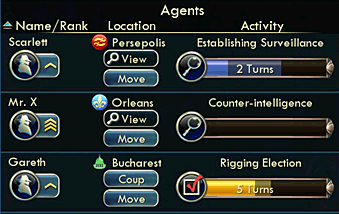 A
Spy is gained at
the beginning of each new era, starting with the Renaissance. Spies can gather
information on foreign cities, steal technology, learn enemy war plans, perform
counter-intelligence missions, and affect influence with City-States by rigging
elections or staging coups. Espionage is conducted entirely through menus; Spies
are not actual units that appear on the map. There are three spy ranks: Recruit,
Agent, and Special Agent. Each subsequent level makes the spy more effective. A
higher ranking spy will steal technologies faster, discover and kill enemy spies
that are trying to steal from you more frequently, rig elections in City-States
more effectively, and have a greater chance of pulling off a coup in a
City-State allied with another civilization. Spies level up when they
successfully steal technology from another civilization or kill an enemy spy
attempting to steal their technology. If a Spy is killed, you will have to wait
a set number of turns before receiving a replacement, who will be at Recruit
experience level.
A
Spy is gained at
the beginning of each new era, starting with the Renaissance. Spies can gather
information on foreign cities, steal technology, learn enemy war plans, perform
counter-intelligence missions, and affect influence with City-States by rigging
elections or staging coups. Espionage is conducted entirely through menus; Spies
are not actual units that appear on the map. There are three spy ranks: Recruit,
Agent, and Special Agent. Each subsequent level makes the spy more effective. A
higher ranking spy will steal technologies faster, discover and kill enemy spies
that are trying to steal from you more frequently, rig elections in City-States
more effectively, and have a greater chance of pulling off a coup in a
City-State allied with another civilization. Spies level up when they
successfully steal technology from another civilization or kill an enemy spy
attempting to steal their technology. If a Spy is killed, you will have to wait
a set number of turns before receiving a replacement, who will be at Recruit
experience level.
A Spy can slowly affect City-State influence over time (increasing your influence and decreasing others') by rigging elections (which occur in each City-State every 12 turns), which appears to be relatively safe but time-consuming. Alternatively, the Spy can try to trigger a coup, which affects influence immediately, but runs the risk of the Spy being caught and executed and incurring a severe influence penalty.
The first civilization to reach the Renaissance Era unlocks Espionage for all players on the map, awarding each player with one Spy to begin with. England receives a bonus Spy. You are also awarded with an additional Spy when you build the National Intelligence Agency (which is a National Wonder).

Cities are rated as targets for Espionage by a "Potential" rating. Ed Beach: "Potential is calculated based on the Science output of the city (obviously, higher is better), as well as the defensive buildings contained in the city, which can slow down a spy quite a bit. Once you’ve established ’Surveillance‘ in an opponent’s city, the potential will be displayed, so you can make a more educated decision about staying, or redeploying somewhere better." From the tooltip on Potential: "You always know the potential of your own cities. If you are in the lead technologically, you should consider protecting your high Potential cities. There are two ways to do this. You may move your own spies to your cities to act as counterspies that have a chance to catch and kill enemies spies before they steal a technology. You may also slow down how quickly enemy spies can steal technologies by constructing buildings like the Constabulary, Police Station, and the Great Firewall."
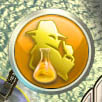 From
the tooltip for the button to Move a Spy: "When a spy is directed to move to a
new city, it takes a number of turns before it becomes fully effective. If the
spy is moving to its owner's city, it will begin counter-espionage to uncover
and kill enemy spies. If a spy is moved to a city that is owned by another
civilization, the spy will begin trying to steal technology from that
civilization. A spy can only steal from a civilization that knows any technology
that the spy's owner does not. If the owner of the city has a spy defending the
city, your spy has a chance of being discovered and killed. This may strain
diplomatic relations! If the spy moves to a city that is a City-State, the spy
will attempt to rig the elections to increase your influence over the
city-state."
From
the tooltip for the button to Move a Spy: "When a spy is directed to move to a
new city, it takes a number of turns before it becomes fully effective. If the
spy is moving to its owner's city, it will begin counter-espionage to uncover
and kill enemy spies. If a spy is moved to a city that is owned by another
civilization, the spy will begin trying to steal technology from that
civilization. A spy can only steal from a civilization that knows any technology
that the spy's owner does not. If the owner of the city has a spy defending the
city, your spy has a chance of being discovered and killed. This may strain
diplomatic relations! If the spy moves to a city that is a City-State, the spy
will attempt to rig the elections to increase your influence over the
city-state."
Diplomat
There is a new type of Spy, the Diplomat. When assigning a Spy to the capital of another civilization, you can choose to assign them as a Diplomat. Diplomats do not steal technology, and are only there to gather information. Additionally, if the target civilization is following a different Ideology, your Diplomat will start spreading Propaganda, increasing your tourism Tourism bonus in that civilization. Because they are a Diplomat, they are in no danger from other spies. They become even more useful when the World Congress is founded, delivering information on how other civilizations are planning to vote, and allowing votes to be traded via diplomacy.
Diplomats are converted from normal Spies. "Do you want this spy to be a diplomat? A spy can be a diplomat if they are placed in the capital of another civilization you are not at war with. (If war is declared, your spy will escape the city.) A diplomat will not attempt to steal technology from the other player but will still provide intrigue. Once the World Congress convenes and the diplomat has begun schmoozing, you will be able to determine their opinion on proposals and trade for their support if needed. Diplomats also conduct propaganda that provides a boost to Tourism output to the target civilization."
Tourism
Tourism exerts a kind of offensive cultural pressure on the civilizations around you. Tourism is generated by Wonders and buildings that have Great Works or Artifacts housed in them. Tourism is increased with Open Borders agreements (+25%), Trade Routes (+25%), and shared religion. Tourism is countered by the foreign civilization's own Culture; your Tourism is measured against that Culture, and ranked from "Exotic" (10%) to "Familiar" (30%) to "Popular" (60%) to "Influential" (100%+). (There is also a new higher level seen in recent shots, "Dominant" (200%), but it's not clear what this means.) If your Tourism exceeds the other civilization's defensive Culture, then you are Influential; become Influential with all other civilizations to win a Culture Victory. Successful Tourism creates Unhappiness in civilizations with different Ideologies than you have chosen.
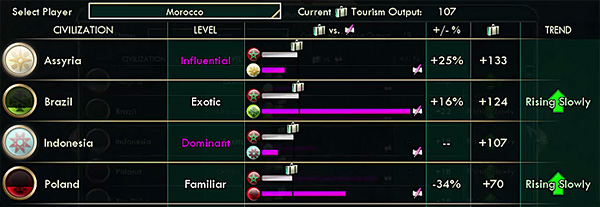
There is a new telltale on the main map top bar for Tourism (represented by a suitcase icon).
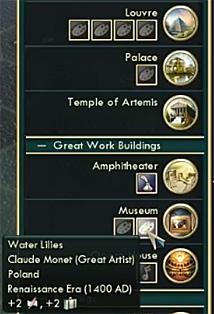 Great Works
Great Works
Great Artists are now split into three types: Great Artists, Great Writers and Great Musicians can now generate named Great Works, which are housed within appropriate buildings like Museums or Opera Houses or Libraries, and generate both additional Culture and Tourism points. There appear to be three types of slots for Great Works, represented by palette, note and quill icons, available in different buildings:
- Palette: Great Work of Art (or Artifact): Museum, Palace, Louvre
- Note: Great Work of Music: Opera House
- Quill: Great Work of Writing: Amphitheater, Library, Great Library
Great Works can be moved between buildings or cities as desired, and they can be traded with other civilizations. When similarly-themed Great Works are grouped together in the same building, it's possible to get an additional bonus. Different building will have different requirements to get a Theme Bonus: a regular Museum gets a +2 bonus for similar works from a similar period, but the Louvre requires a diversity of works from different civilizations and periods to earn a bonus.
New Great Person action: Create Great Work: This order will consume the Great Person and create a new Great Work in the nearest city with a Great Work slot of the appropriate type.
Each individual named Great Artist, Writer, or Musician creates a Great Work specific to that historical artist. For example, the Great Writer William Shakespeare creates the Great Work "Macbeth." There are too many named artists and works to list here.
 Archaeology
Archaeology
Great Works can also be obtained through the new Archaeology system. After you research Archaeology, you'll be able to build Archaeologist units that can visit Antiquity Sites throughout the map (such the site of a battle fought earlier in the game, a previously discovered Ancient Ruin, a previously pillaged resource, or a previously destroyed Barbarian Camp) and search them for Artifacts you can display in Museums or other appropriate buildings. Artifacts appear to be interchangeable with Great Works of Art, fitting in the same slots in the same buildings as Works created by Great Artists.
Artifacts can be extracted both in your own territory and in City-State or foreign civilization territory -- provided that you have an Open Borders agreement. However, creating dig sites in foreign territory will create diplomatic tension with that civilization; they won't appreciate your removing their historical artifacts.
Archaeologist units search for Antiquity Sites, which are revealed on the map with the discovery of Archaeology. The Archaeologist can convert the Antiquity Site into an Archaeological Dig, which after 3 turns can either yield a Great Work Artifact or be transformed into a Landmark improvement. The Archaeologist unit is consumed in this process. Archaeology is now the only way to create Landmark improvements; the ability to create Landmarks has been removed from the Great Artist.
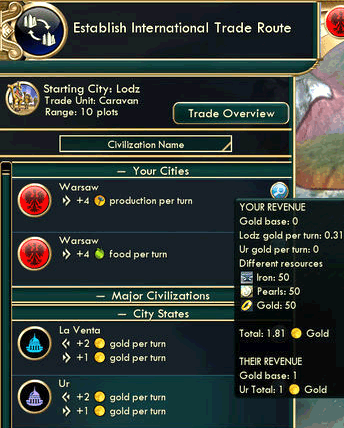 International Trade Routes
International Trade Routes
International Trade Routes replace the extra gold previously earned from working river or coast tiles. You can now build special Trade Units such as the Caravan and Cargo Ship, and set them up so that they automatically follow a route back and forth between two cities. Your first two trade routes are unlocked with Animal Husbandry and Sailing, and more can be unlocked as the game progresses (typically at least seven or eight by the end of the game). Certain technologies, Wonders and civilization Unique Abilities increase the available number of International Trade Routes.
Note that the existing Trade Routes formed by road and rail connections to the Capital still exist (hence the "International" designation of the new Trade Route system); these old trade routes are now called "City Connections."
Clicking on a Trade Unit in a city brings up a list of possible routes for that unit type from that city. Trade with one of your own cities can transfer food (if you have a Granary) or production (if you have a Workshop). Food or Production from an internal Trade Route are bonus; they are not drained from the source city's own output. Trade with a foreign city brings gold to both parties, the amount of which depends on a number of factors. Sea routes appear to be twice as lucrative as land routes (with an explicit "2x" modifier). Trade routes from cities next to a river gain +25% Gold. The per-turn gold value of the Trade Route increases with the distance of the route, the difference in local resources between the two cities, and the existence of Markets and other trade-related buildings in your city. In addition to gold, trade routes can also transmit religion, and cultural influence, and this transmission can go both ways. Trade with a partner who is ahead of you in technology can yield science for you. Trade Routes generate a positive diplomatic modifier with the trading partner.
Trade Routes last for 30 turns (on Standard game speed), after with the unit will ask to be reassigned. Unless they are plundered or terminated through war or change of ownership of destination city, Trade Routes last for the full duration; they cannot be manually canceled. The Trade Units operating the trade routes can be intercepted by hostile military units, allowing you to disrupt other civilization's trade routes if you go to war with them. This also means your own trade routes must be protected from barbarians and enemy civilizations. There is a player-toggled map overlay displaying trade routes (you can see one in this shot coming out of Sao Paolo and another in this shot coming out of Nineveh). A city may have many trade routes, but only one with each other city.
Ed Beach: "Although both parties gain gold from the route, the civilization that the trade route originates from gets a larger sum of gold than the destination civilization. Additionally, other systems hitch a ride on trade routes, like religious pressure, science (science can be gained from more advanced civilization this way), Tourism bonuses, and more. Trade routes can also be created between two cities of the same civilization. Once the origin city has a Granary, it can send food to the destination city, and once it has a Workshop it can send production. This can be powerful if you have a new city that needs to be “pumped up”, or a city that’s constructing a Wonder that could use a production bump.
"A lucrative trade route is going to give you a positive modifier to your relationship with that partner, and if you’re spreading religion then you’re likely to see a benefit from that as well.
"In general, the Trade Route system rewards you for connecting two cities that have very different local resources. So, it lists which local resources are found in one city and not another, and the more of those you have the more gold you'll get out of the trade route."
 Trade Units
Trade Units
This is a new type of unit (represented by a pentagonal icon) that travels in an automated fashion along a pre-determined Trade Route between two cities. They are exclusively based in cities, similar to Air units, and only move out of the city when assigned to a Trade Route or Rebased to another city. As a separate unit type, Trade Units are in their own "layer" and so can stack with Civilian and Military units. Trade Units can be attacked by enemy forces or barbarians, but the movement of the unit not under the direct control of the player. Each unit type has a maximum range to another city (Caravans appear to be 10, Cargo Ships 45), but they don't move that whole distance each turn.
The two known Trade Units are the Caravan and Cargo Ship. It appears that they upgrade in later eras, similar to the Worker; the Cargo Ship appearance changes in later eras from a wooden sailing ship to a modern container ship.
 Attacking Trade Routes
Attacking Trade Routes
Military units have a new action button: "Plunder Trade Route." It can be used to destroy an enemy Trade Unit and collect a cash bonus when the military unit is in the same hex as the Trade Unit. Any Trade Unit that moves into the same hex as a hostile military unit is automatically plundered. You must have declared war with the owner of the trade route, and this action will damage relations with the third party (the other civilization that your target was trading with). Trade Routes with an enemy city are immediately destroyed when war is declared.
